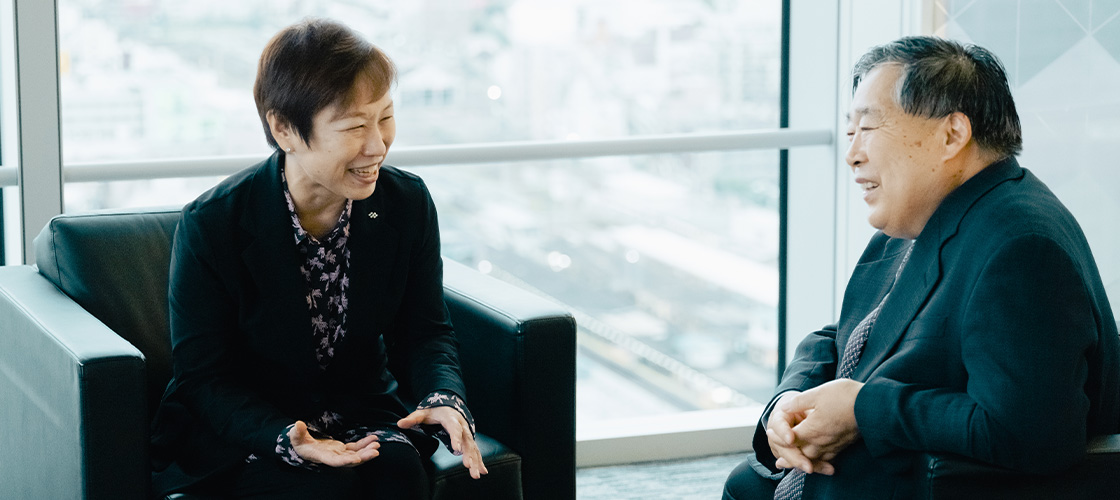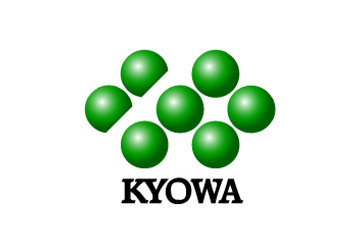Grateful for Microorganisms. The Future Possibilities Created by FermentationTakeo Koizumi, Fermentation Scholar and Food Culture Theorist
Yuki Kanzaki, Director of the Board and President & Chief Executive Officer, KYOWA HAKKO BIO CO., LTD.
< Part Two >
Takeo Koizumi, a fermentation scholar and food culture theorist, and Yuki Kanzaki, Director of the Board and President & Chief Executive Officer of KYOWA HAKKO BIO CO., LTD., (Kyowa Hakko Bio) discussed fermentation, which has been attracting more and more attention in recent years. In part one, the two looked at the greatness and wonder of fermentation and microorganisms from the perspective of food, which is familiar to many people.
Now, in part two, the two considered the future sustainability that will be achieved by combining the efforts of microorganisms and humans, from the perspective of the future usage of fermentation as a means of solving social problems that humans face.
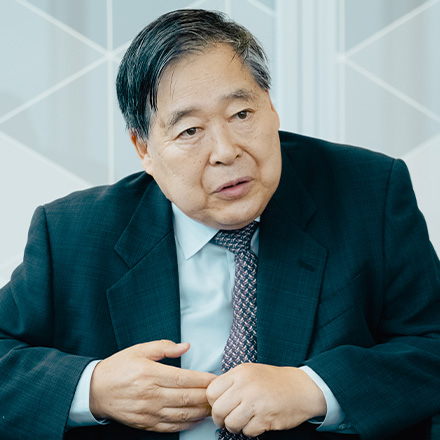
Takeo Koizumi
Fermentation Scholar and Food Culture Theorist
Born in 1943 to a family of sake brewers in Fukushima Prefecture. He is a professor emeritus at Tokyo University of Agriculture. Ph.D. in agricultural studies. He specializes in food culture theory, as well as the study of fermentation and brewing. At present, he is a visiting professor at Kagoshima University, Fukushima University, Beppu University, Ishikawa Prefectural University, Miyagi University, and others, as well as the Head of the School of Fermentation and Sommelier Course for Fermented Foods.
He has written more than 148 books, including "Shoku Areba Raku Ari (translation: Food is Comfort" (Nikkei), "Hakko Shokuhin Raisan (translation: In Praise of Fermented Food)” (Bunshun Shinsho), "Shoku to Nihonjin no Chie (translation: Food and the Wisdom of the Japanese)" (Iwanami Gendai Bunko), "Shoku no Sekai Isan (translation: World Heritage of Food)" (Kodansha), "Edo no Kenko Shoku (translation:The Healthy Food of Edo)" (Kawade Shobo Shinsha), "Shoyu, Miso, Su wa Sugoi (translation: Shoyu, Miso, and Vinegar are Amazing)" (Chuko Shinsho), and "Chonoryoku Biseibutsu (translation: Microorganisms with Superpowers)” (Bunshun Shinsho). He has also been publishing a serialized work, "Shoku Areba Raku Ari (translation: Food is Comfort)," in the Nihon Keizai Shimbun for 29 consecutive years.
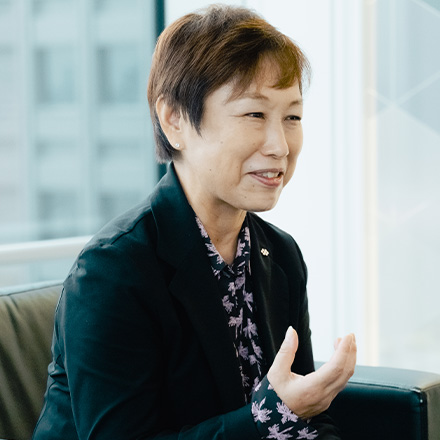
Yuki Kanzaki
Director of the Board and President & Chief Executive Officer, KYOWA HAKKO BIO CO., LTD.
Born in 1963. After completing graduate school at Saga University in 1988, she joined a manufacturer of in-vitro diagnostic agents. In 1992, she joined Kirin Brewery Company, Limited. After serving as Brewing Manager of Kirin Brewery Tochigi in 2007, she served as Deputy General Manager of the Alcoholic Beverage Technology Research Institute, R&D Division at Kirin Company, Limited in 2013, General Manager of Kirin Brewery Kobe in 2015, Executive Officer and General Manager of Kirin Brewery Yokohama in 2017, and Managing Executive Officer and General Manager of Kirin Brewery Yokohama in 2019, before serving as Senior Executive Officer and General Manager of the Corporate Planning Department of KYOWA HAKKO BIO CO., LTD. in 2020 and assumed her current position from January 2022.
Contents
- Not Just in Food. There are Still a Lot of Amazing Things to Say About Fermentation.
- Health, Environment, Energy, Food... Can Social Problems be Solved by Fermentation?
- Changes to Fermentation Culture From Global Warming
- "Grateful for Microorganisms" at the Heart of Everything
- Fermentation and Sustainability
Not Just in Food. There are Still a Lot of Amazing Things to Say About Fermentation.
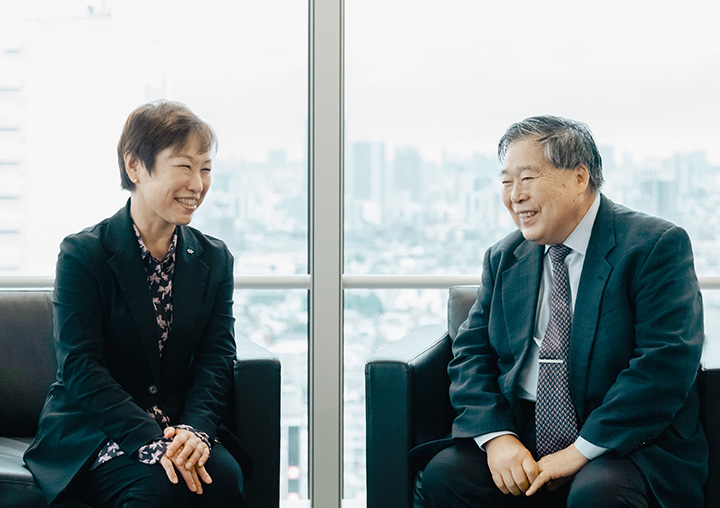
Q: In part one, you talked about the greatness and wonder of fermentation, mainly from the viewpoint of food. In part two, I would like you to go further and talk about what sort of potential fermentation and microorganisms have for the future of humankind.
Koizumi:We have talked about various things, but there are still a lot of amazing things to say about fermentation. In general, the most popular area is food, but microorganisms play an active role in many more fields. In fact, considering fermentation from the perspective of industry, the total production of the fermentation industry in Japan amounts to several tens of trillions of yen, of which food accounts for less than 20% or so.
Q: What makes up the remaining 80% plus?
Koizumi:For example, there is the field of pharmaceuticals. Antibiotics, anticancer drugs, antiulcer agents, and other treatments are all made by fermentation. In addition, it is now common to use fermentation to produce hormones, vitamins, etc., and the various amino acids that constitute the proteins that make up the human body are also produced by fermentation. Every year, the role of fermentation in areas related to human health becomes more significant. These areas are exactly the specialty of Kyowa Hakko Bio.
Kanzaki:That’s right. Since our founding, we have always maintained the viewpoint of "solving social problems through fermentation." Amino acids derived from fermentation, which Dr. Koizumi mentioned earlier, are an extremely important business for Kyowa Hakko Bio. Now that the technology has been established, it would be inconceivable to make amino acids by any other method than fermentation. This is how amazing it is as a method of production, both in terms of the environment and the cost.
Koizumi:We ask microorganisms to do the job. In other words, if we use their ability, it is far more economical than producing amino acids using scientific methods. In the future, it is surely possible that fermentation will solve many of humankind’s unsolved problems. I strongly believe this, and for the past 20 years, I have continuously advocated for the phrase “FT revolution,” i.e., the “Fermentation Technology revolution.”
Health, Environment, Energy, Food... Can Social Problems be Solved by Fermentation?
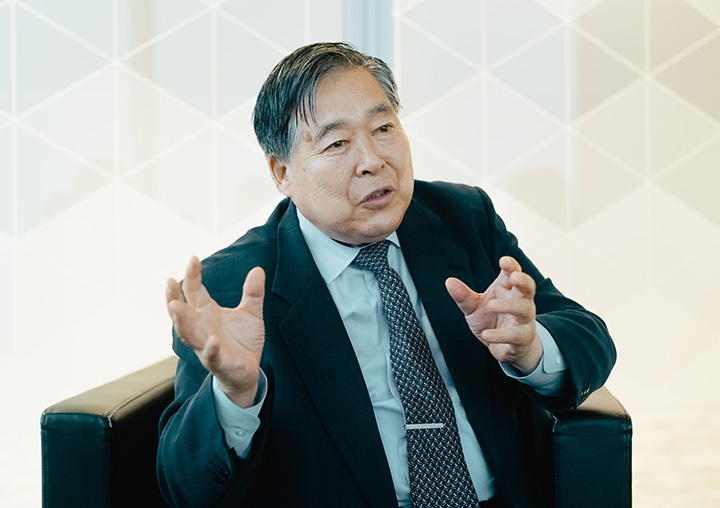
Q: Can you tell us again about the future of fermentation and the FT revolution?
Koizumi:The FT revolution has four major pillars. The first, as noted above, is in health and medicine. Fermentation has great potential for creating wonder drugs for conditions that humankind has yet to overcome, such as cancer.
The second pillar is the environment. For example, we incinerate the garbage we produce every day. From the perspective of CO2 emissions, however, nothing could be worse for the global environment. In that case, we could ferment it and return it to the soil. I support a compost center at a mountain in Sukagawa in Fukushima Prefecture. At this facility, when microorganisms with strong organic decomposition capabilities are activated in food waste, they generate heat close to between 90°C to 100°C and turn the trash into fertile soil after 25 days. We provide the soil to local farmers, who are very happy when their vegetables grow well. Microorganisms are very hard working and can work 24 hours a day, making this economical because it costs only about 3,000 yen in electricity costs per ton of food waste. It also reduces CO2, so it has many benefits.
The third pillar is energy. In Europe and the United States, a movement has begun to emerge where energy is produced with hydrogen bacteria. Hydrogen bacteria use hydrogen as their source of energy to convert CO2 into organic matter. The advantages of these bacteria include making biofuels, etc., as well as contributing to reducing CO2 emissions. This is a circulatory system, so once it is in operation, it can continue to generate energy for a long time. However, since they are still microorganisms and thus require nutrients, I think it will be possible to operate in a less wasteful manner if we link these efforts with the processing of food waste that I mentioned earlier.
Finally, the fourth pillar. Now, I would like to return to the topic of food. In other words, the problem of food for humans. We are expected to face food shortages in the future. We have recently learned that something unexpected can serve a purpose for this issue. It has rarely been used as a resource, despite the fact that an enormous amount, hundreds of millions of tons, is produced annually. I am talking about dead leaves. The fibers of dead leaves can be broken down by an extremely strong fungus called cellulase to produce glucose. If we use this as a base, it would be surely be possible to produce a variety of foods. There is also anticipation in relation to such things.
Additionally, speaking of food problems, one of the things I'm most interested in right now is the technology of making meat through fermentation. There is a significant amount of research underway on the creation of artificial meat by combining inosinic acids with amino acids, which are created in large quantities from fermentation.
Kanzaki:Kyowa Hakko Bio is also very interested in how technology for creating amino acids from fermentation, which we have developed over many years, can contribute to solving food problems in the future. Today, crickets are popular as a source of protein, but if cultured meat produced by fermentation appears, it will likely be easier to incorporate into day-to-day meals. Dr. Koizumi, have you ever actually eaten anything cultured artificially as a meal?
Koizumi:I did a somewhat interesting experiment before. I put bio-liquid and koji mold spores in a large Erlenmeyer flask and cultivated it over a prolonged period of time. The koji mold then formed a solid substance called a mycelial mat. I lifted it off, grilled it, and ate it as a steak. It was very delicious. There are differences at the DNA level, but it is not so different from mushrooms in terms of eating microbes that we have grown.
Changes to Fermentation Culture From Global Warming

Q: We have returned to the topic of food, and you mentioned environmental issues earlier. For example, will fermented food produced by local natural features be affected as global warming progresses?
Koizumi:Of course. As the temperature changes, the reproducing microorganisms will also naturally change. For this reason, there is a history of changes in ways of making fermented food in line with these changes in the temperature. I think there will continue to be changes in the future in response to global warming.
Kanzaki:For example, Pilsner beer, the symbol of modern beer, originated in the Czech Republic, but when it was created in the 19th century, it was made in cellars that naturally had low temperatures. Now that the average temperature is higher, however, it cannot be made without a refrigerator.
However, it is also interesting to note that there are changes in the culture surrounding alcohol. In the past, there was a rule that brewed alcohol like Japanese sake was made in the north and distilled liquor like shochu was made in the south. This was because we couldn't make brewed alcohol in warm southern areas because of the temperature and humidity. These days, however, thanks to temperature control technology, it is possible to make whatever alcohol we like anywhere we want. I expect that places where fermented foods are made will continue to change in the future as a result of changes in the environment and advances in technology in line with the times.
Koizumi:I think we will be able to make things that can be managed with refrigeration equipment anywhere, but there will also be some things that use natural power that are affected. Especially at the raw material level, there will probably be many difficulties. Recently, tea manufacturers in Kagoshima and Shizuoka Prefectures have even been visiting Hokkaido to find places to create tea fields based on the assumption that global warming will occur.
Kanzaki:In fact, before entering Kyowa Hakko Bio, when I was the general manager of a brewery at Kirin Brewery, I was confronted with the problem that the places where we can grow hops, which are essential for beer production, are rapidly moving northward as a result of global warming. In Japan, hops are mainly produced in the Tohoku region because they can grow only in a cool climate with lots of sunlight, but the northern limit is rapidly moving north. It is possible that we will end up in a situation where we must either hope for further selective breeding of hops, or really go as far as Hokkaido to grow them.
"Grateful for Microorganisms" at the Heart of Everything

Q: As a manufacturer, I am sure that you work to ensure a stable supply of microorganisms and raw materials, as they change as a result of the environment, by controlling them through the development of new technologies. I think you must make minor adjustments on a daily basis, and it must be a lot of hard work. How do you work with the invisible presence of microorganisms in actual production situations?
Kanzaki:Kirin's beer brewing is focused on ensuring that appropriate microorganisms and yeast are available and creating an environment where they can comfortably perform their fermentation work. Brewer's yeast is like one of the brewers and it is an important partner for us. In any case, the management of the yeast is important, as it affects the quality of beer and the variety of flavors.
On the other hand, Kyowa Hakko Bio's business is a little different. In order to add the functions we humans require to our products, we search for microorganisms that perform these functions, and we develop microbes that match our ideal criteria. Alternatively, we may develop a system that enables microorganisms to make things that previously could only be made by scientific synthesis. By using fermentation-based methods, we can also mass-produce substances that previously could only be produced in small batches.
Koizumi:So, do you feel it is quite different in terms of your work?
Kanzaki:Having said that, from the basic point of view of manufacturing, I feel that both methods have a great many things in common. Both of them are the same in the sense that they are only possible through fermentation and the microorganisms that control this process. Our attitude of "grateful for microorganisms" is at the root of everything in Kyowa Hakko Bio. In order to give a tangible shape to this feeling, in 1999, we erected a stone monument honoring microorganisms at our Yamaguchi Production Center in Hofu to commemorate the 50th anniversary of our founding.
Koizumi:Wow, it's a monument to microorganisms, so to speak.
Fermentation and Sustainability
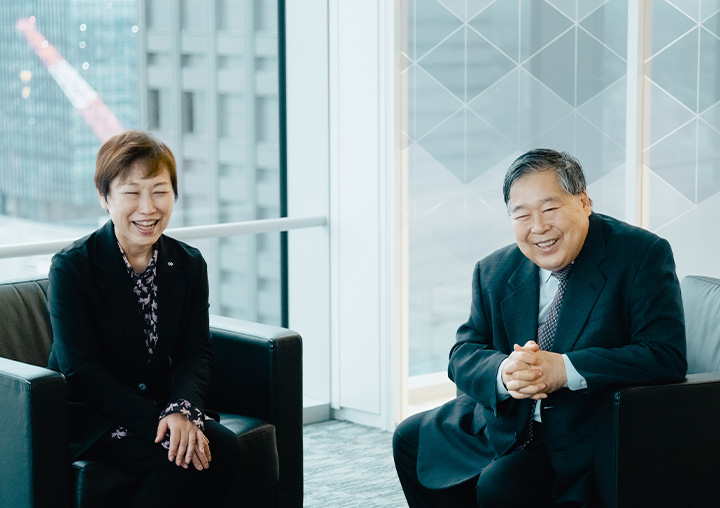
Q: In this conversation, I have felt your love, trust, and gratefulness for microorganisms.
Kanzaki:Both Kirin Brewery and Kyowa Hakko Bio started from microorganisms and fermentation. We would not be able to do our current work without respect for them. On a larger scale, this is our “Reverence for Life.”
Koizumi:Indeed, we must be grateful to microorganisms. The brewing culture that provides nutrients that make our bodies is all thanks to microorganisms and fermentation. This applies to miso, soy sauce, vinegar, and mirin. Some people may not know this, but even katsuobushi (dried bonito shavings) uses fermentation technology.
Q: I think that in many cases, we eat and use things that were actually the result of fermentation in our day-to-day lives without thinking about them. Fermentation is so abundant in the world.
Kanzaki:That's right. I think there are many things that people don't notice because we take the things around us for granted. It wasn't until I was told that I realized “this has also been fermented!” There is also often a long history behind these things. In other words, I think it is fair to say that fermentation is closely related to sustainability.
The world today is not in a state where we can use lots and lots of energy for development. If we continue to do so, we will run out of resources in the foreseeable future, and we will be stuck. In other words, making the most of what we have today should become the norm. With that in mind, I think that fermentation technology, which creates something positive by using what we have today as food for microorganisms, will become even more indispensable;, and the areas where it plays an active role will continue to expand. It is also a point of pride for us to be able to make our living from this technology, and we are steady in our resolve to continue to refine this technology.
Koizumi:I really have high hopes for Kyowa Hakko Bio as a supporter of the future of humankind. Actually, I love to take Ornithine which is made from fermentation by your company. Thanks to this, I am over 80 years old, but my hair is shiny and I am healthy, as you can see (laughs). I am really happy that there is a culture of fermentation in areas close to our lives, and on the other hand, I think how sad our lives would be without it.
Kanzaki:I cannot imagine such a dull world. I’m grateful for everything microorganisms do for us.
Release date: November 24, 2022
* The content, affiliations, titles, etc., are as of the time of release.
- Photography:Yuji Ueno
- Text:Chikara Tsujimoto
- Editing:RIDE Inc.


